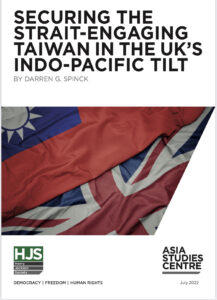 Recent geopolitical events have triggered a renewed urgency for the United Kingdom, London’s transatlantic allies, and UK Indo-Pacific partners to develop policies aimed at helping maintain the status quo in China–Taiwan cross-Strait relations and ensuring uninterrupted sea and air
Recent geopolitical events have triggered a renewed urgency for the United Kingdom, London’s transatlantic allies, and UK Indo-Pacific partners to develop policies aimed at helping maintain the status quo in China–Taiwan cross-Strait relations and ensuring uninterrupted sea and air
trade routes throughout the region.
Russia’s invasion of Ukraine has forced Western military planners to rethink how Taiwan can best defend itself. COVID-19’s impact on global supply chains has led to a re-evaluation of trade policy and discussions on how Western democracies can better secure trade routes for strategic goods such as semiconductors.
Chinese President Xi Jinping’s restrictive “ZeroCOVID” policies and attempts to further Beijing’s hegemonic ambitions throughout the Indo-Pacific have led to a reconsideration of China as a reliable trade partner. The Biden administration’s apparent “strategic clarity” on Taiwan’s defence has renewed debate on how
to arm Taiwan after a coordinated sanctions policy failed to deter Russia from continuing its attack on Ukraine.
The Henry Jackson Society’s report, Securing the Strait: Engaging Taiwan in the United Kingdom’s Indo-Pacific Tilt, offers British as well as US and European policymakers suggestions on formulating policies to face these mounting challenges.
This report:
- Explains how the Global Britain integrated review can lead to helping Taiwan defend itself against forced reunification from the People’s Republic of China’s (PRC’s) People’s Liberation Army (PLA);
- Illustrates how maintaining the status quo, deterring China’s forced reunification attempts through targeted coalition-building, arming Taiwan, and supporting Taipei’s participation in key global governance institutions are in the UK’s national interest;
- Analyses key lessons learned from the ongoing war in Ukraine;
- States the potential risks of strategic clarity;
- Details the importance of forming targeted partnerships to mitigate risks related to the PRC’s economic and military policies, while avoiding challenges associated with large collective defence guarantees throughout the Indo-Pacific;
- Provides an overview of security dilemmas associated with a policy pivot from ambiguity to strategic clarity;
- Proposes policies aimed at positioning the Australia–United Kingdom–United States Partnership (AUKUS) trilateral defence pact as the cornerstone of an anti-hegemonic coalition to prevent China’s dominance of the Indo-Pacific and Beijing’s ability to project power throughout the region’s island chains;
- Discusses Taiwan’s need for deterrent weapons and options for arming the Taiwanese;
- Outlines UK trade priorities with Taiwan and throughout the Indo-Pacific region, aimed at job creation in the United Kingdom and the growth of the UK’s economy through competition, innovation, and fair markets; and
- Recommends advance policies to help secure the Taiwan Strait and elsewhere throughout the Indo-Pacific region when UK national interests are at stake.


